Introduction to Expert Pool
The expert pool on Local and Regional Economic Development (LRED) is a member-based group of experts with profound experience and expertise in various thematic economic development sectors. Initially, the expert pool came to realization when the national and local consultants who previously worked on LRED and value chain assignments with GIZ’s Green Resilient Agricultural Productive Ecosystems (GRAPE) programme came together, intending to foster collaboration and joint efforts around LRED.
The GRAPE programme has worked with national and local consultants from the project's onset and has re-contracted those consultants showing high capability and professionalism. Therefore, founding an expert pool consisting of LRED practitioners who master the tools and are ready to apply them on demand is an essential step to ensure the sustainability of the project achievements and further help the country in its federalization and decentralization effort.
Expert pool members have shown the motivation to support the federalization and decentralization process of Nepal and its local economies and, at the same time, feel comfortable becoming part of a community of practice of like-minded professionals.
The expert pool members are local and regional experts with solid and hands-on experience in solving economic development issues with a focus on LRED. The expert pool members are LRED facilitators and consultants, high-level dialogue facilitators, policy advisors, influencers in economic development and promotion, and trusted group members.
The expert pool members aim to facilitate/moderate by working with other development partners, national NGOs, business membership organizations, and Nepalese government organizations at different administrative levels interested in designing, implementing, or monitoring LRED/Local Economic Development (LED) and other economic promotion activities.
The expert pool has been initiated to achieve the following outcomes:
- Ability to respond to requests from institutions working on economic development
- Vehicle for the application of the LRED approach and its tools (and related approaches) - for the federal, provincial, and local stakeholders
- Community of practice for networking, knowledge-sharing, exchange of experiences, and marketing services - for the expert pool members
- Mechanism to enhance business opportunities and visibility for individual experts
The Expert pool aims to work with development partners, national NGOs, business membership organizations, and Government of Nepal offices/organizations at different administrative levels interested in designing, doing, or monitoring LRED/LED and other economic promotion activities.
The Expert Pool can be reached via expertlred@gmail.com for requests and inquiries on technical assistance in collective solutions and technical assistance in LRED/LED and related topics.
Search the LRED expert Pool
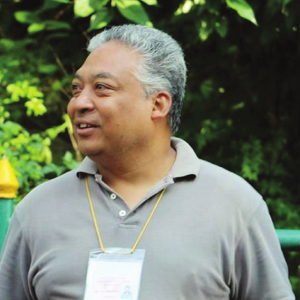
Anil Chitrakar
anilchitrakar@gmail.com
Born and schooled in Nepal, Anil Chitrakar is trained as an engineer and energy planner at the University of Rajasthan (India) and the University of Pennsylvania (USA). He started his career as an energy engineer at the Academy of Science and Technology, traveling to remote areas in Nepal to transfer renewable energy technologies.
He then launched conservation education campaigns to mobilize the youth and school children to link technical solutions' supply and demand sides and enable learning outside the classroom. He is an Ashoka Fellow. He joined the National Conservation Strategy team for Nepal and went on to head the International Union for Conservation of Nature ( IUCN) Nepal office.
Anil focused his efforts on heritage conservation and environmental management across Nepal. In 1993 he was one of the 100 "Global Leaders for Tomorrow" awardees at the World Economic Forum in Davos. He recently received the Tech Award in Silicon Valley for his work on renewable energy technologies. Currently, he is expanding his career in renewable energy, biodiversity, and heritage conservation.
Anil was Chairperson of the Himalayan Climate Initiative and helped launch the 1550 km long Great Himalayan Trail in Nepal. He is also part of the Kailash Sacred Landscape team. Anil is the President of Siddharthinc, a private initiative dedicated to unlocking markets. He has a regular Youtube video-Walkabout in the Nepali Times.

Badri P. Bastakoti, PhD
bpbastakoti@hotmail.com
Badri P. Bastakoti has worked in industrial, enterprise, rural, and institutional capacity development for over 25 years in Nepal and abroad. His expertise includes economic and financial analysis, feasibility studies for investment in industries and small enterprises, comprehensive business planning, domestic and international trade, value chain development, entrepreneurship, cooperatives, institutional development, and agriculture development strategies. He holds an MA in Industrial Development from the IJEA in the UK and earned a PhD in International and rural development from the University of Reading, I-JK. His research has focused on the issues of livelihood diversification in rural households through enterprise development after electrification.
Over his professional career, he worked for the Nepal-based international NGOs, UN DP, FAO, GIZ, and EU funded projects supporting the Government of Nepal mainly on trade, value chain and capacity development, and private sector agencies. Currently, he works as a Project Coordination Consultant for the European Union-funded Trade and Investment Program (TIP) managed by the International Trade Centre (ITC) under the aegis of the Ministry of Industry, Commerce and Supplies (MolCS). He has contributed research papers in international peer review journals and book chapters on various aspects of development issues, particularly enterprise development, trade and livelihoods diversification. He has organized and managed visits and attended international forums, meetings and conferences to promote trade and value chains, mainly coffee.

Deepti Khakurel
deepti.khakurel@como-mesopartner.de
Deepti Khakurel has more than 16 years of experience working on economic development, democracy assistance and governance, focusing on cross-cutting thematic areas, including youth, gender and minority rights. Her prime work areas include private sector development, constitution building, support to political parties/association, parliamentary support and strengthening civil society groups.
Since 2019, she has been engaged as the National Team Leader, Local and Regional Economic Development for GIZ's Local and Provincial Economic Development project on behalf of the Como-Mesopartner consortium. She has facilitated and managed various Local Economic Development interventions, including the Participatory Appraisal for Competitive Advantage (PACA), Business Climate Survey (BCS), Economic Development Strategy, and capacity-building initiatives with Nepal's federal, provincial and local governments.
She founded Yatra, a youth organization, in 2004 and co-founded the Association of Youth Organizations Nepal (AYON) in 2005. She has extensive experience working with international organizations, including the Oslo Center for Peace and Human Rights and International IDEA. She has been engaged in several research initiatives. She has been granted the WWF's Young Conservation Leaders Award 2009 for her contribution and work on youth and the environment. She has experience working in Nepal, Somalia, Kenya, India and Norway.
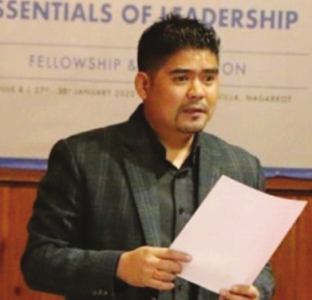
Dilip Gurung
dilip@kgsinc.com.np
Dilip Gurung is a management practitioner and co-founder of KGS Inc. Mr Gurung was previously the General Manager of Lead International Pvt. Ltd, a Nepal-based consultancy organization. Dilip has managed national-level projects across all four pillars: design, implementation, monitoring, and evaluation. He understands the context, design, planning, execution, risk identification and mitigation, financial management, and reporting aspects of project management from a decade of experience managing a broad portfolio of varied development projects.
Dilip specializes in strategic planning, project management, operations management, and capacity-building interventions for both the development and the private sectors. Mr Gurung's recent portfolio includes food and beverage enterprises, the IT industry, an art management company, and the local level government of Sudurpashchim and Karnali province in formulating growth strategies, setting goals, and developing action plans along with an assessment of overall organizational performance. Gurung holds a Master of Political Science degree from Tribhuvan University, a Post Graduate Certificate in Development in Global Societies from Leeds Metropolitan University in the United Kingdom, and a Post Graduate Diploma in Business Management from Stratford College in London.

Ishan Ghimire
ishanghimire@gmail.com
Ishan Ghimire is a highly skilled and accomplished professional with 15 years of experience in applied research and teaching. His research interests lie at the intersection of sociology and anthropology of work, labour, and religion. Ishan has published several reports and working papers addressing critical issues in the development sector. He excels in qualitative and quantitative research, project evaluations, and enumerator training in thematic areas such as labour, migration, children's rights, gender, public health, and governance.
With a Master's in Socio-Cultural Anthropology from Durham University, UK, Ishan is firmly committed to academic excellence. His deep passion for academia reflects in his work as an Assistant Professor of Anthropology and South Asian Civilizations at Kathmandu University. Beyond his professional achievements, Ishan actively contributes to society through volunteering and has held leadership positions in non-profit organizations focused on drug rehabilitation, environmental sustainability, and youth engagement.
Fluent in Nepali, Hindi, and English, Ishan's fieldwork experience has spanned Nepal, India, and the United Kingdom. Currently, he is exploring South Asia's ancient and medieval history and lesser-known Buddhist and Shaivaite cave shrines in Maharashtra, India. Ishan's multidimensional expertise, commitment to excellence, and passion for socio-cultural research make him a valuable asset in applied research and academia.

Maniram Singh Mahat
manimahat@gmail.com
Maniram Singh Mahat worked as an Executive Director (2015-2020) and Director (2011-2015) in the Town Development Fund (TDF), GON. Earlier, he worked with GIZ as a planner, senior finance expert, advisor, and coordinator from 1993 to 2010.
He has worked extensively in urban policy-making, planning, urban development, PPPs, property tax management, local economic development, project development and appraisal. He has completed several research works on local economic development, urban development strategy, urban finance, conflict transformation and development, housing finance, property taxation, public-private partnerships, and agricultural land use management.

Manoj Paudel
manozep@gmail.com
Mr Manoj Paudel is a young entrepreneur and economist currently serving as the Executive Committee Member and Chairperson of the Investment and International Affairs Forum at the Federation of Nepalese Chambers of Commerce and Industry (FNCCI). He has a proven track record of fostering partnerships and collaborating with stakeholders in government, private, and development sectors to promote innovation in infrastructure, investment, entrepreneurship and governance.
He founded Aadhyanta Fund Management Limited, a domestic fund mobilization (private equity/venture capital) platform uniquely promoted by government and private commercial banks. As the Chairperson of Invest and Infra, he has provided strategic advisory to private, development and public sector clients. He also serves as the Director of Prime Commercial Bank, a leading commercial bank in Nepal. He has provided strategic guidance and leadership to the Bank's growth trajectory. He has previously worked as an expert for different ministries, members of parliament, government entities such as the Investment Board Nepal and the Ministry of Industry, Commerce and Supplies, and multilateral organizations.
His expertise, experience, and leadership have made him a respected and valuable contributor to Nepal's policy innovation field. He has also served as a Visiting Faculty at Kathmandu University, where he taught international economics. He holds an MSc from the London School of Economics, where he was a Chevening scholar.

Niraj Khanal
niraj@antarprerana.com.np
Niraj Khanal is an entrepreneurship ecosystem enabler, passionate about innovation and startups. He has been contributing to the entrepreneurial ecosystem of Nepal for the last 15 years as a mentor and angel investor. Niraj is the Co-founder/CEO of Antarprerana, a private company that supports business incubators in Nepal and Bhutan. He has been engaged in startup policy development, where he is closely working with the Government of Nepal, private sector apex bodies and universities.
He is working on different stages of funding for startups, from seed investment to angel investment and has facilitated Nepali companies to secure investment. Niraj is the representative for PUM Netherlands senior experts. Through this organization, he has enabled Nepali companies to get business support from Dutch senior experts. He is also a member of the Startup and Innovation Committee of FNCCI.
He facilitates MBA classes on Entrepreneurship and Innovation at Tribhuvan University and other private colleges. Niraj was recognized by Kathmandu University as an Outstanding Alumni in the year 2018 for his contribution to the Entrepreneurship and Development sector.
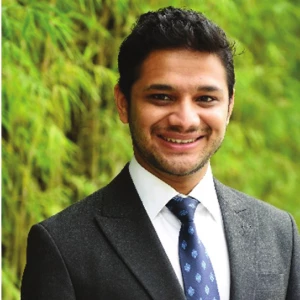
Nishant Khanal
nishantkhanal7@gmail.com
Nishant Khanal is a policy economist with more than six years of experience working on economic policy research with South Asian Governments and INGOs. Nishant thoroughly understands development economics, social policy, public finance, and regional trade in South Asia. Nishant possesses significant abilities in public finance management, international trade, policy research, and knowledge management, in addition to his technical knowledge and expertise in economic policy analysis.
He has a solid background in macroeconomics and a Master's in Public Policy, with a concentration on Economic Policy, from the National University of Singapore. Nishant has presented his research papers on regional forums, including the South Asian Economic Summit and the South Asian Economics Students Meet. He is passionate about public policies and how they affect economic growth. His additional expertise includes stakeholder management, communications, data analysis, visualization, and quantitative research.
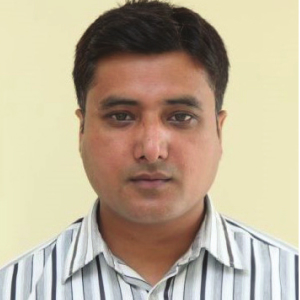
Pramod Rijal
Pramodrijal3@gmail.com
Pramod Rijal is an economist who has independently formulated and carried out several research activities and authored ten policy publications on renewable energy, investment, trade, anti-competitive practices, business regulations and malnutrition. He was a researcher in various projects, including the Nepal Economic Growth Agenda, Economic Benefits from Nepal-India Electricity Trade, and Independent Assessment of Matching Grant Scheme. Before working as an independent consultant, he was a Director of Practice (Economy & Energy) at Policy Entrepreneurs Inc. (PEI), a Senior Economist at the Institute for Integrated Development Studies (IIDS), a Manager at the South Asia Network of Economic Research Institutes (SANEI) and a Research Associate at Samriddhi Foundation.
He holds an MSc in Economic Development and Policy Analysis from the University of Nottingham, IJK, as a Chevening Scholar and a Master's in Economics from Tribhuvan University, Nepal.
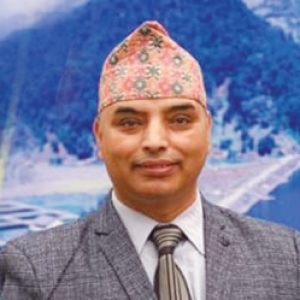
Ram Chandra Lamichhane, PhD
erips_rc@outlook.com
Ram Chandra Lamichhane holds a PhD in "Peace and Development in Nepal: An Appreciative Inquiry Approach". He has a Certification in "Appreciative Inquiry for Igniting Positive Business and Societal Transformation" from Case WesternReserve IJniversity, USA. He is a certified "Conflict Transformation and Peace Building Across the Culture" trainer from the SIT Graduate School of USA He is a well-known expert on the "Appreciative Inquiry Approach" in South East Asia, He introduced Appreciative Inquiry in China Xian in 2013.
He has prepared the training manual for Gender Equality and Social Inclusion in Forestry, Local Peace Committee, Community Development, and WASH. He has served as a member of the Master Plan Review Team of the President Chure Madesh Development Committee. He is the executive member of CEAPRED; worked as a founder vice chairperson of the City Planning Commission of Pokhara Metropolitan City; past president of Imagine Nepal, Founder Chairperson of the Eastern Research Institute of Positive Science; served as an Executive Director of the Association of Community Radio Broadcasters (ACORAB) Nepal for four years (2014-2018). He led the periodic plan preparation process of Viamd Municipality, Tanahun, Belaka Municipality Udayapur, Bheem Datt Municipality Kanchanpur, Rupa Rural Municipality Kaski, Gaurishankar Rural Municipality Dolkha, Thakur Baba Municipality Bardiya, and Kathmandu Forestry College. He has facilitated GIZ's GRAPE project inception workshop in all clusters and is now a freelance consultant.
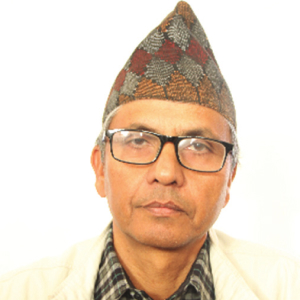
Ramji Prasad Neupane, PhD
ramjineup@yahoo.com
Ramji Neupane holds a PhD (Regional and Rural Development Planning) and a Master's from the Asian Institute of Technology, Bangkok. He has over 20 years of professional experience with development organizations inside and outside Nepal. As the National Project Manager (NPM), he provided Technical Assistance (TA) to the Ministry of Industry, Commerce and Supplies (MolCS), Government of Nepal, to implement the Micro Enterprise Development for Poverty Alleviation (MEDPA) program in all 753 local governments of Nepal from 2018 to 2021. During 2014-2018, he worked with UNDP Nepal as the NPM of MEDEP.
Through MEDPA-TA, he was instrumental in institutionalizing entrepreneurship development in Nepal as per the federal governance structure. Over a decade (2001-2012), he worked for the development and implementation of Canadian development aid programs in Nepal. He demonstrated evidence of producing quality research papers and experience working in conflict situations, including the UN peace mission in Cambodia.

Shraddha Shakya
Shraddha.shakya@antarprerana.com.np
Shraddha Shakya is a Business Development Manager at Antarprerana Pvt. Ltd. She has established herself as an entrepreneurship ecosystem enabler who has served in different parts of Nepal and Bhutan. She mainly works with the Government, private industries, and academic institutions for local economic growth, primarily focusing on strengthening the entrepreneurship ecosystem. Additionally, she is supporting the Nepal government in drafting policies and procedures related to entrepreneurship.
She is also a local representative for PUM Netherlands Senior Experts, helping University Grant Commission and colleges design and develop their incubation center guidelines and execution plans.
She holds an MSc in Social Science in Global and International Development Studies. She is also a part-time faculty member at different colleges. Her efforts have earned her recognition, including the Best Business Idea Award for the Nava Udhyamshala (business incubation program) and a Roskilde University Scholarship Awardee in 2014.
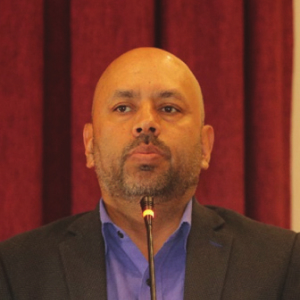
Tej Hari Ghimire, PhD
ghimire.tejhari@gmail.com
Dr Tej Hari Ghimire is a senior economist. As senior management and technical leader, he contributed knowledge and technical solutions to local and regional economic development (LRED) processes, rural finance, client protection, agriculture and livelihood, investment, resilience, and integrated project initiatives. He worked with Paribartan (2017-present) as lead assessor, Norlha, a Swiss-based INGO (2012-2017) as Country Director, Centre for Microfinance (2006-2012) as CEO, Nepal-German Chamber of Commerce and Industry (2004-2006) as CEO, government authority as advisor, and Sushma Koirala Memorial Trust (1997-2002) as Executive Director/ Rural Development Specialist.
He has accomplished 75 independent assignments in the field of LRED training, diagnostics, strategy formulation, program design, project evaluations, baseline studies, end-line and impact assessment, ICT platform feasibility for the World Bank, and programming recommendations as per the project appraisal in remote parts of Nepal, Bhutan, and China/ Tibet for service clients such as GIZ, COMO Consult Germany, Noriha, Save the Children, Mercy corps, wwr-, WHH, UNNATI Program- NIRAS-Danida,AIN, SWC, ILO, ICIMOD, AEPC, CECI, and CIDA-CMF. He authored 'Planning for Rural Development in Nepal: The Five I Cycle Model' and over 25 unpublished papers/ reports.
He holds PhD in Economics and a Master's in Economics from Tribhuvan University, and Post Graduate in Integrated Rural and Regional Development Planning from Weitz Centre for Sustainable Development Studies, Rehovot, Israel.



